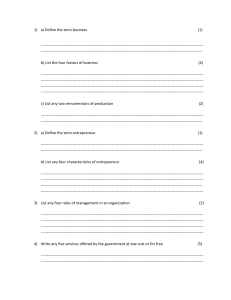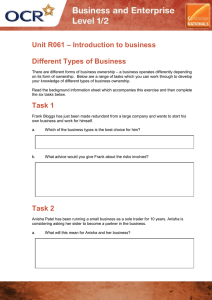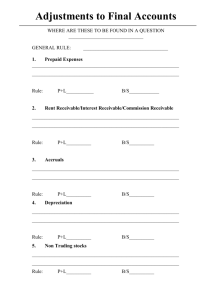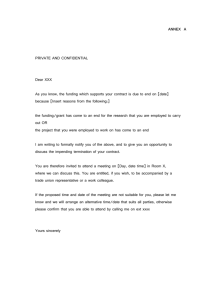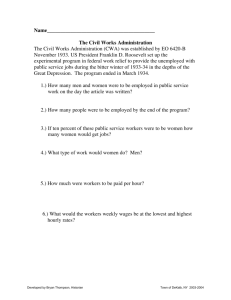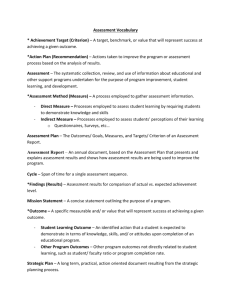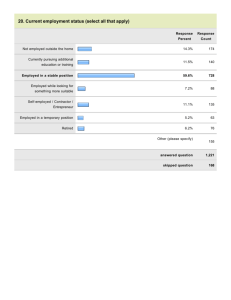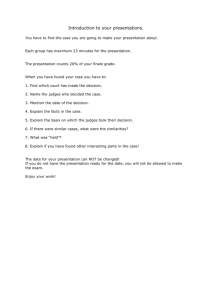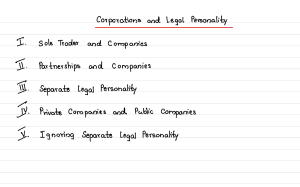Business Planning
advertisement
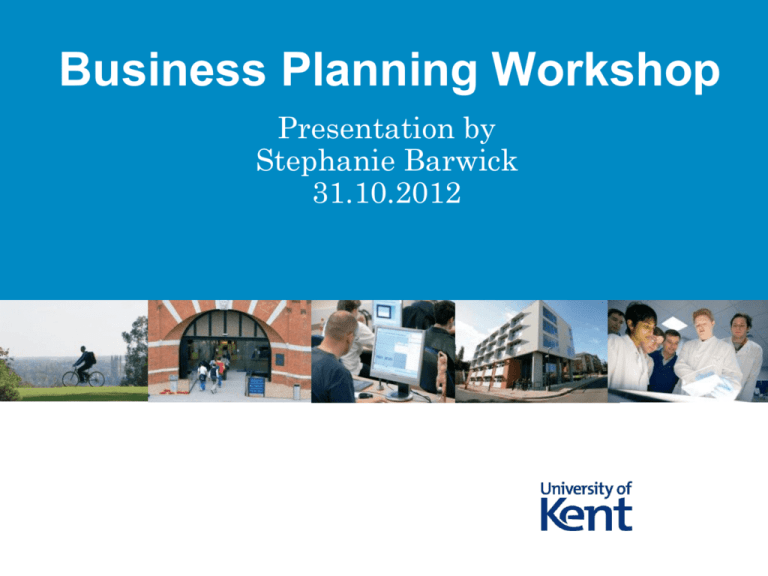
Business Planning Workshop Presentation by Stephanie Barwick 31.10.2012 Practical guide to starting a business Questions to ask yourself: Pre Start Checklist The need for a Business Plan What help is available What do I do next? HAVE YOU GOT WHAT IT TAKES? • • • • • • • • Can you find a new angle? Do you thrive on adversity? Could you make a decision and stick to it, regardless? Are you in it just for the money? Are you really suited to working alone? Could you take big risks? Are your plans realistic? Can you hack it when the going gets tough? Pre- Start Checklist Why do you want to start a business? In detail, think about what your business will do - try to be specific. What makes you think it is a good idea for a business? Do you have all the technical skills or knowledge to make your business succeed? THINGS TO THINK ABOUT, NOW! •What, exactly is your business idea? •Have you got what it takes to run a successful business? •How much do you need to ‘earn’ from the business? •How much money do you need to start the business and where will it come from? •What will happen to your business if you are ill, injured or have a personal crisis to deal with? Who do you think your customers will be? Where do they go at the moment? List who your competitors are. If you have no competition, WHY NOT? How do you plan to compete with them, and DON’T say that you will be cheaper as this does not always work. If you are on benefits now, find out exactly what you will be entitled to when you start your business as you may not be entitled to any. Please check carefully. Important things to think about pre start up How much money will you need to pay yourself from the business each month, to cover your personal drawings? How much money do you need to start the business everything leading to day one of your business? How will you raise the money? How much time are you able to give to researching and planning to set up your business? What do you hope to achieve in the first year of business? What do your family think of your self employment ideas? What are the risks that you face in starting your business? FORMS OF TRADINGWhat’s the difference? •Sole Trader •Partnership •Limited Company •Co-operative •Franchise Sole Trader •One self employed proprietor •Simplest method of trading •Tax advantages over a Ltd. Co. •NO registration •Liable for all debts •Lack of continuity Partnership •Two or more self employed • proprietors •Simple method •Tax advantages over a Ltd. •Co. •Shared responsibility •Each responsible for all business debts •Potential disagreement in decision making Limited Company • • • • • • • Some business transactions may be easier Not legally self employed Tax advantages when profit exceeds £50k Avoids inheritance tax Little personal asset protection Statutory accounts required Start up and running costs higher CAN I CALL THE BUSINESS WHAT I LIKE? •No - you need to check •You should display your that the name is not being used by anyone else. •Ltd. Co’s must register business details at your place of work •You should display your with Companies House business details on all your paperwork •Others may register •Take advice before you voluntarily finally decide on the name. BlackBerry®, I’VE HEARD ABOUT BUSINESS PLANS - I DON’T NEED ONE, DO I? •YES! Initially a business plan is for you, to help you to decide whether the business is going to work before you start. Why you need a business plan A business plan should include: What you want to do Where you want to go How you are going to get there SO, WHAT WILL A BUSINESS PLAN DO FOR ME? •Sets targets and helps you decide how you will reach them •Once you are trading, it will make sure you stay focussed on your goals •‘Organises’ your Market •It helps you to •Helps to identify resources ‘measure’ the performance of your business • •It is a necessity to raise finance Research Helps you to decide whether the Business idea is viable ISN’T FORECASTING JUST GUESSWORK? •No - it is more calculated than that. •Once you have carried out MARKET RESEARCH you will have some real facts to deal with. Testing out your ideas Creating a demand for something that you •produce or offer as a service to your fellow students. Promoting it through word of mouth or on your intranet etc. • • • Extending the boundary by crossing • over into other media that the • target market uses
